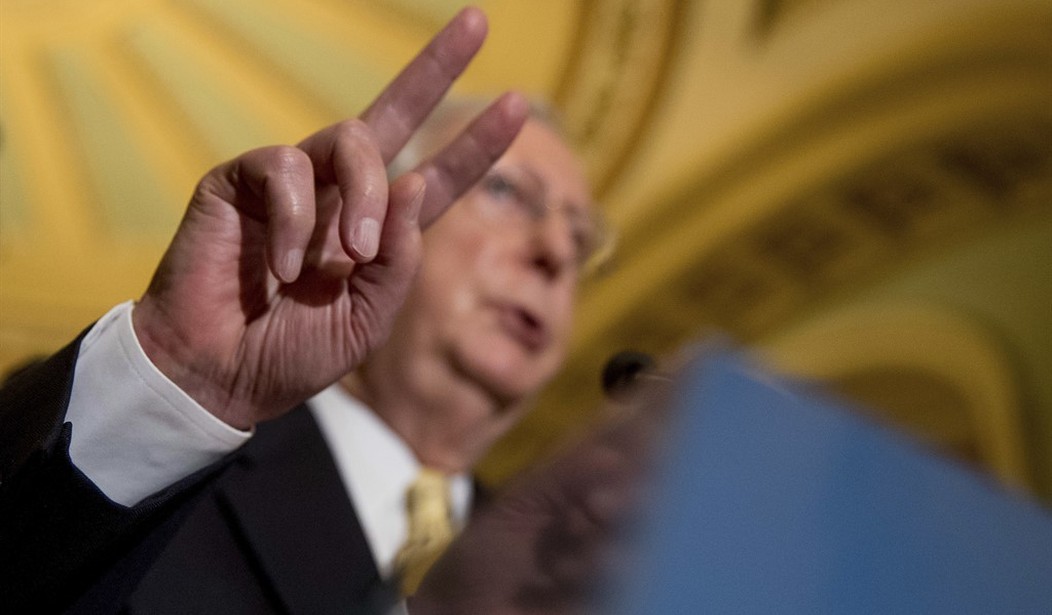The BCRA is dead, and … long live the BCRA? The bill looked dead earlier this week when both conservatives and moderates fled from the upcoming motion to proceed, leaving Senate Majority Leader Mitch McConnell with egg on his face. But will an infusion of cash at the twelve-figure level resuscitate the repeal-and-replace approach to ObamaCare? According to The Hill, it’s the latest effort to round up the 50 votes necessary for passage of the reconciliation bill:
In a bold move to revive their healthcare bill, Senate Republican leaders are getting ready to propose giving $200 billion in assistance to states that expanded Medicaid, according to a person familiar with internal Senate negotiations.
The huge sum would be funded by leaving in place ObamaCare’s net investment income tax and its Medicare surtax on wealthy earners, according to the source briefed on the proposal. …
The source said the aid would be targeted primarily at Medicaid expansion states, adding it would be distributed on “the back end” of the bill’s timeline, when the legislation would phase out the generous federal contribution for expanded Medicaid enrollment — a central pillar of ObamaCare.
The goal is winning the support of wavering moderate Republicans who will make or break the legislation: Sens. Rob Portman (R-Ohio), Lisa Murkowski (R-Alaska), Shelley Moore Capito (R-W.Va.) and Dean Heller (R-Nev.).
That may appeal to the moderates, but the conservatives won’t like it at all. They want the savings to go toward tax reform, which the savings from necessary Medicaid reforms will help buffer. While there is enough deficit improvement from these reforms to allow for horse-trading at this level, it’s about all McConnell can afford to give up while still qualifying the BCRA under reconciliation, and it could complicate the tax-reform effort that is next on the Republican agenda. It’s tough to imagine Mike Lee and Ted Cruz coming along for this buyoff, let alone Rand Paul — and if they don’t, then the whole effort is pointless.
At least for the moment, it’s not working with Bob Corker. In a tweet this morning, Corker expressed support for the straight repeal and two-year delay on replacement strategy that McConnell floated after the collapse of support for the BCRA:
My statement regarding the Senate health care debate: pic.twitter.com/5KOmTWT9Hc
— Senator Bob Corker (@SenBobCorker) July 20, 2017
Donald Trump had earlier offered some qualified support for this plan, but pulled back at yesterday’s luncheon:
Trump, who has given mixed messages on whether he wants to just repeal or simultaneously repeal and replace ObamaCare, on Wednesday told Republican senators at a White House lunch that repealing ObamaCare without a replacement was not an option.
“We can repeal it, but we should repeal it and replace, and we shouldn’t leave town until this is complete, until this bill is on my desk,” Trump said.
That was the point of the luncheon — to get the GOP to act on its seven-year promise and repeal ObamaCare. If that’s now Trump’s position, then both he and McConnell need to take the other option off the table. As long as it exists, the conservatives will insist on it, and the moderates will insist on the spiced-up BCRA, and neither will get to 50 votes.
The other point of yesterday’s event was to show Trump getting personally involved in the effort. The debacle of the past few days finally prompted a public intervention, and the first impressions were of constructive talks. Politico later reported that it didn’t progress much beyond those talks, as all sides are loathe to move off of their entrenched positions:
Talks “narrowed down to try to figure out what is causing members not to be able to vote in favor or problems they have with the bill,” said Sen. Jerry Moran (R-Kan.), who opposes the GOP’s latest repeal and replace draft. “It had merit and it’s something that should have been taking place.”
Added Sen. John Kennedy (R-La.): “We’re at our best when we’re among ourselves.”
As the night dragged on, however, Republicans cited good progress but nothing to suggest they had overcome the obstacles that have stymied their previous efforts.
At least 20 Republicans, including leadership allies, moderates and conservatives, worked through the party’s myriad disagreements over Medicaid, coverage numbers, lowering premiums and cutting regulations.
There are few problems that can’t be overcome with $200 billion in home-state spending … but this just might be one of them.








Join the conversation as a VIP Member